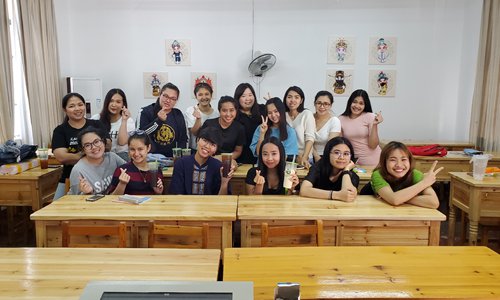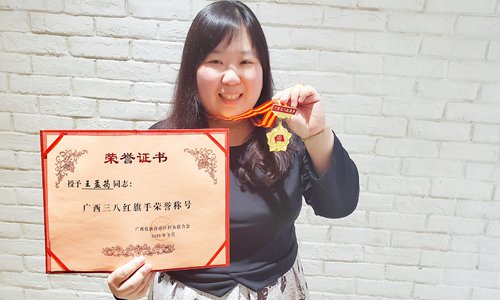HOME >> CHINA
Taiwan scholar teaching politics in mainland draws popularity
By Hu Yuwei Source:Global Times Published: 2019/8/1 19:34:51

Wang Mengyun (center in the back) and her students pose for a group photo. Photo: Courtesy of Wang Mengyun
What is it like to be a young female teacher from Taiwan teaching politics at a university in the Chinese mainland? That's what draws the inquisitiveness of many toward Wang Mengyun.
Wang, 36, has just become the first teacher from the island of Taiwan to officially join a public institution in South China's Guangxi Zhuang Autonomous Region.
She teaches political thought and politics at the School of Politics and Public Administration of Guangxi Normal University.
She displayed the typical politeness and wit of a Taiwan girl, which explains her popularity among mainland college students, and also her ability to make political class more lively and interesting.
Many students added her on WeChat after listening to her very first lecture on Taiwan politics. A female student even won a prize at the Cross-Straits Youth Creative Short Film Contest, for which the student shot a video eliciting how she was inspired by Wang Mengyun.
Wang inspires students to interpret the heated topics from the political arena with a problem-solving attitude, such as the ongoing protests and violence in Hong Kong.
Students never like rigid recitation of political policy, but want to feel the void that lies in the political system through vivid stories. That's where the attractiveness of Wang's lectures lies.

Wang Mengyun Photo: Courtesy of Wang Mengyun
Caring about sensitivity"A lecturer from Taiwan" and "teaching political science in the mainland" are some of the most common yet somewhat contradictory labels that enrich Wang's experience.
"Discussion around Hong Kong extradition bill is an opportunity to show students the historical scars left by the Treaty of Nanjing in 1842 and the Treaty of Shimonoseki in 1895 that caused a split of hundred years to China," Wang told the Global Times.
"There are no troubles that last forever among family members, she said.
From her own experience, she said teachers from Taiwan are more tolerated and cared for in the Chinese mainland.
She was impressed by her colleagues' warmth and sincerity toward a young lady from the island of Taiwan. "I could not feel it at all when I was a student in Taiwan, because you can never read it in textbooks on cross-Straits relations, journals, or media reports in Taiwan."
One of her senior colleagues whom she had never met before took the initiative to share all materials of relevant courses, including the teaching syllabus, slides of all class presentations and final examination papers of all the years, upon her arrival.
Teaching politics in mainland universities is not as stressful as one might expect, Wang said. Mainland students are curious about life, culture, education system and other soft issues of Taiwan, said Wang. "Many of them grew up watching Taiwan dramas or pop music, making them full of curiosity and affinity for Taiwan."
"Historical reasons brought differences between the Chinese mainland and Taiwan. I hope my students can understand the root causes of these differences and realize that we should narrow them and not hype these gaps," Wang said.
Beautiful encounter
Wang described her bond with Guangxi Normal University as "a magical and wonderful destiny." For a PhD graduate from Tunghai University, Taiwan, it's hard to imagine a mainland university being her only choice.
Back in July 2017, a friend from Guangxi Normal University invited her to visit Guilin, Guangxi. While browsing the local sites she came across a recruitment ad for a politics lecturer posted on the university admissions office website.
"I finally decided to come to the mainland instead of staying in Taiwan partly because Taiwan has been facing the problem of an aging society for many years. It takes a long time to find a teaching position in Taiwan, and many PhD students graduated several years ago are still searching for stable posts," Wang told the Global Times.
In contrast, the first contract she signed with Guangxi Normal University is for an eight-year term, which is a much more stable position than in Taiwan.
She can return to Taiwan by a direct flight that takes just about an hour, which makes her more determined to stay in the Chinese mainland for her future development.
"The Taiwan Affairs Office of the State Council organizes students from Taiwan to visit the mainland every year. I can feel the soaring development of the mainland in the past decades. My father is engaged in import and export trade, and he knows more about Taiwan's export dependence on the mainland, so my parents encouraged me a lot to work here," she stated.
More international, open
Increasingly, Wang's identity allows her to think about the concerns from the perspective of youth from both the mainland and Taiwan.
"Many young PhD graduates from Taiwan are hesitant to work in the mainland, fearing that their academic connections would be cut off, or they might face other potential restrictions. But my own experience tells that their fears are misplaced," said Wang.
Wang asserted that mainland universities are very international and open, giving equal opportunities and benefits to Taiwan scholars, similar to those that the mainland academics receive. Publishing books in Taiwan counts as research achievements in the mainland.
"My university fairly encourages the junior lecturers to apply for overseas exchange, which is less seen in Taiwan. I hope young graduates from Taiwan can be more open-minded and learn more about the refreshed mainland," Wang told the Global Times.
In the eyes of many, Wang has become a bridge between the youths cross-Straits. She constantly shares her tips for applying for a post in the Chinese mainland in online and offline meetings, and also invites her doctoral supervisor in Taiwan to give lectures to her mainland students.
She also informed that the Chinese mainland's preferential policies for Taiwan businesses and residents introduced in 2018 brought more than 100 lecturers from the island of Taiwan to join universities in Guangxi.
"My successful employment gives compatriots in Taiwan the confidence to open a pathway to the mainland," Wang said. "I am glad that the mainland is offering such a warm and sound policy to boost Taiwan compatriots' confidence."
Newspaper headline: Crossing the Straits
Posted in: PROFILE